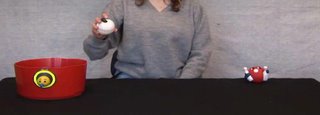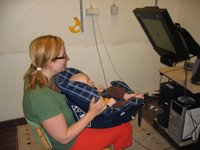Neuroscience
 Babies as young as 12 months already have a rudimentary understanding of other people’s intentions. That’s according to Terje Falck-Ytter and colleagues who observed babies’ eye movements as they watched a video presentation of a person picking up toys and putting them in a bucket.
Babies as young as 12 months already have a rudimentary understanding of other people’s intentions. That’s according to Terje Falck-Ytter and colleagues who observed babies’ eye movements as they watched a video presentation of a person picking up toys and putting them in a bucket.
Six-month-olds tended to follow the trajectory of the toys through the air. By contrast, 12-month-olds’ eyes jumped ahead to the bucket as if they were anticipating the person’s intentions, just as happened when adult participants watched the video.
However, this jumping ahead to the bucket only occurred when a person was moving the toys. It didn’t occur when the video showed the toys flying through the air apparently self-propelled, or they were moved mechanically, in which case the 12-month-olds and adults both moved their eyes as the 6-month-olds had done – that is, they were mostly fixated on the toys and didn’t jump ahead to the bucket.
 The researchers believe the 12-month-olds’ ability to anticipate people’s intentions is based on the functioning of mirror neurons that are activated both when the baby performs a movement and when they see that same movement performed by someone else. Crucially, the 12-month-old babies, but not the 6-month-olds, have themselves mastered the action of putting toys in a bucket, thus allowing them to map their observation of someone else performing the action onto their own neural representation for performing the action.
The researchers believe the 12-month-olds’ ability to anticipate people’s intentions is based on the functioning of mirror neurons that are activated both when the baby performs a movement and when they see that same movement performed by someone else. Crucially, the 12-month-old babies, but not the 6-month-olds, have themselves mastered the action of putting toys in a bucket, thus allowing them to map their observation of someone else performing the action onto their own neural representation for performing the action.
“We have demonstrated that when observing actions, 12-month-old infants focus on goals in the same way as adults do, whereas 6-month-olds do not”, the researchers said.
__________________________________
Falck-Ytter, T., Gredeback, G. & von Hofsten, C. (2006). Infants predict other people’s action goals. Nature Neuroscience, 9, 878-879.
Post written by Christian Jarrett (@psych_writer) for the BPS Research Digest.
- Babies Understand We Can't Always Get What We Want
Babies as young as ten-months are able to recognise the intent behind a failed action, thus revealing a surprisingly sophisticated understanding of other people's minds. Amanda Brandone and Henry Wellman, who made the finding, used a methodological...
- Babies Can Tell The Difference Between Happy And Sad Music
By nine months of age, babies can already tell the difference between jolly jingles and sad ones. You can probably imagine that demonstrating this was no mean feat for researchers, given the obvious difficulties of asking babies what they think. Ross...
- What Makes A Baby Smile?
By eight months of age, babies are already smiling ’socially’. That’s according to Susan Jones and Hye-Won Hong at Indiana University who filmed 20 eight-month-old infants while they played for ten minutes alone in a room with their mother who was...
- Tv 2.0 For Babies?!
Last Tuesday's Times reports on a study by Vanderbilt University researchers suggesting that interactive television can actually be good for children's development. Earlier research showed that 3-5 year olds who watched Blues Clues "score better...
- Cognition In Babies
Newsweek's cover story for Aug 15 is all about "Your Baby's Brain". Reads like a literature review lite on cognition in babies -- fascinating, and simple enough for non-scientists to understand. That's the way I like my cognitive science!...
Neuroscience
One-year-old babies predict other people’s intentions
 Babies as young as 12 months already have a rudimentary understanding of other people’s intentions. That’s according to Terje Falck-Ytter and colleagues who observed babies’ eye movements as they watched a video presentation of a person picking up toys and putting them in a bucket.
Babies as young as 12 months already have a rudimentary understanding of other people’s intentions. That’s according to Terje Falck-Ytter and colleagues who observed babies’ eye movements as they watched a video presentation of a person picking up toys and putting them in a bucket.Six-month-olds tended to follow the trajectory of the toys through the air. By contrast, 12-month-olds’ eyes jumped ahead to the bucket as if they were anticipating the person’s intentions, just as happened when adult participants watched the video.
However, this jumping ahead to the bucket only occurred when a person was moving the toys. It didn’t occur when the video showed the toys flying through the air apparently self-propelled, or they were moved mechanically, in which case the 12-month-olds and adults both moved their eyes as the 6-month-olds had done – that is, they were mostly fixated on the toys and didn’t jump ahead to the bucket.
 The researchers believe the 12-month-olds’ ability to anticipate people’s intentions is based on the functioning of mirror neurons that are activated both when the baby performs a movement and when they see that same movement performed by someone else. Crucially, the 12-month-old babies, but not the 6-month-olds, have themselves mastered the action of putting toys in a bucket, thus allowing them to map their observation of someone else performing the action onto their own neural representation for performing the action.
The researchers believe the 12-month-olds’ ability to anticipate people’s intentions is based on the functioning of mirror neurons that are activated both when the baby performs a movement and when they see that same movement performed by someone else. Crucially, the 12-month-old babies, but not the 6-month-olds, have themselves mastered the action of putting toys in a bucket, thus allowing them to map their observation of someone else performing the action onto their own neural representation for performing the action.“We have demonstrated that when observing actions, 12-month-old infants focus on goals in the same way as adults do, whereas 6-month-olds do not”, the researchers said.
__________________________________
Falck-Ytter, T., Gredeback, G. & von Hofsten, C. (2006). Infants predict other people’s action goals. Nature Neuroscience, 9, 878-879.
Post written by Christian Jarrett (@psych_writer) for the BPS Research Digest.
- Babies Understand We Can't Always Get What We Want
Babies as young as ten-months are able to recognise the intent behind a failed action, thus revealing a surprisingly sophisticated understanding of other people's minds. Amanda Brandone and Henry Wellman, who made the finding, used a methodological...
- Babies Can Tell The Difference Between Happy And Sad Music
By nine months of age, babies can already tell the difference between jolly jingles and sad ones. You can probably imagine that demonstrating this was no mean feat for researchers, given the obvious difficulties of asking babies what they think. Ross...
- What Makes A Baby Smile?
By eight months of age, babies are already smiling ’socially’. That’s according to Susan Jones and Hye-Won Hong at Indiana University who filmed 20 eight-month-old infants while they played for ten minutes alone in a room with their mother who was...
- Tv 2.0 For Babies?!
Last Tuesday's Times reports on a study by Vanderbilt University researchers suggesting that interactive television can actually be good for children's development. Earlier research showed that 3-5 year olds who watched Blues Clues "score better...
- Cognition In Babies
Newsweek's cover story for Aug 15 is all about "Your Baby's Brain". Reads like a literature review lite on cognition in babies -- fascinating, and simple enough for non-scientists to understand. That's the way I like my cognitive science!...
